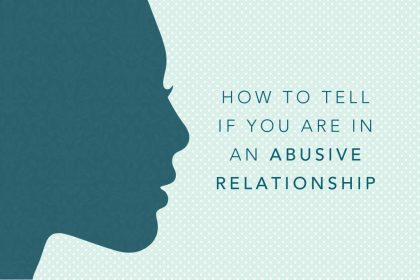Five types of abusive partner you might be in a relationship with – and why you need to leave them
Are you in an abusive relationship? Find out the five types of abusive partner you need to be aware of, and why you need to leave them.
Romantic relationships can have a hugely positive affect on our mental health and wellbeing and the more stable our relationships are the better we feel.
This is not always the case for all partnerships and if things aren’t going well or we find ourselves in an unhealthy relationship with a controlling partner, you are likely to feel very unhappy and it affects how you feel about yourself.
It’s easy to think if you found yourself in a bad relationship you would just leave but it rarely is as simple at that. You might have been together a long time, be married, have children or the behaviour might have been going on so long you might not recognise your partners actions as coercive or abusive.
Such behaviours often begin gradually and escalate over a period of time, and you often don’t realise what is happening until you start to feel some of the impacts on your mental health and how you got to feeling so differently in yourself and about your life. Just know that there are mental health services for survivors of abuse & assault out there that are paramount for survivors to live a healthy life.
Five types of abusive partner you might be in a relationship with
There are different types of abusive behaviour that show up in varying ways and there is often a combination which will impact you. Here are five types of abusive partner, or different personas your partner may adopt to control and abuse you.
1) The Charmer
The Charmer shows up in new relationships. They are a magnanimous, charismatic character who pretends to both you and others at the onset of your relationship that they are just what you are looking for and that they are really into you. They are never honest about wanting to control you at this point.
Charmers build you up and love-bomb you until you begin to have genuine feelings for them. However, in this process of hooking you in they will also do things that make you feel indebted and that you owe them in some way for being treated so nicely.
You can feel trapped and stuck in those moments pulled and coerced into feeling or sorry for them, guilty for wanting to meet your own needs but responsible for meeting theirs.
2) The Bully
The Bully’s behaviour doesn’t always involve physical abuse or assault but simple passive aggressive behaviours like sulking or going silent on you.
You can spend a huge amount of time trying to work out why they are behaving like that and questioning what you did that was so wrong to deserve this kind of behaviour. This is tiring and can wear you down, but ultimately you find yourself paying all your attention on them neglecting your own needs.
Bullies can frighten, scare and intimidate their partner in a variety of ways, all of which can leave you feeling nervous or on edge, vulnerable, anxious, fearful and angry even if you aren’t safe to show it. After you have experienced a frightening or traumatic incident, or a pattern of such incidents, your body can begin to develop an exaggerated stress response.
It is hard to live with this repeated stress response and it can have a damaging impact on your physical and mental health. You can experience a recurring pattern of response, whereby you anticipate something bad happening to you at any minute, which then triggers and activates the stress response, creating a habitual pattern of response.
This is known as being hyper-vigilant and over-watchful. Examples of triggers might be: hearing a loud bang, a door being slammed, someone shouting at you, hearing others arguing, tense atmospheres or someone glaring at you or giving you ‘that’ look – there are many others.
3) The Mindmixer
Generally speaking everyone in a coercive and controlling relationship will experience the Mindmixer. Your partner picks fault with you, plays mind games by gaslighting you, compares you to others, and is dismissive about how you look, which may affect the way you see yourself.
You too might start finding fault in the way you look and begin to dislike your appearance. You might think that your body is less than perfect or inadequate, that you are ugly and unattractive. You might find yourself changing aspects of how you look to suit your partner rather than yourself, in the hope that they will pay you more attention and find you attractive.
Consequently, it is likely you will feel muddled, unable to think straight, confused, losing a grip, less confident than you used to be and over-sensitive to everything.
A coercive or controlling partner behaves in such a way as they get under your skin and change the way you see yourself. It is a subtle process and often you aren’t aware that it is happening.
If someone is being nice to you some of the time, you tend not to consider that they would do anything intentionally to make you feel bad. You don’t know what to think anymore; all you notice is your unhappy feelings of being low, tearful, tired and hopeless much of the time. Here is when you need to ask yourself: ‘Why would someone who says they love me do or say hurtful things to me?
4) The Taker
The Taker’s behaviours are focussed on getting sex, forcing or coercing you to do things of a sexual nature that you didn’t want to or felt unable to prevent. This persistent coercion and pressure to have sex can be subtle and lead you to believe that you have consented.
You may have consented to sex but may not have consented to doing things of a sexual nature that made you feel uncomfortable. The reality is that it is never your fault if you are sexually coerced and assaulted. None of these feelings are easy to express but it is quite normal for anyone who experiences sexual coercion and abuse to feel humiliated, degraded, and too shamed, exposed, disconnected or numb to tell anyone what has happened to them.
The impact of the Taker on their partner’s mental health is devastating and can lead to you losing interest in things that once gave you joy, a constant sadness, lacking in energy, difficulty sleeping and concentrating and feeling utterly crushed, trapped and defeated by these feelings.
When you feel so badly about yourself, it can be difficult to know how to manage these strong feelings. Some people want to punish themselves, perhaps by using self-destructive and harmful behaviours to help them cope or have suicidal thoughts.
5) The Keeper
In the initial stages of a relationship, you may feel fully committed to being with your partner all of the time even if it means you neglect your friends and family. It feels new and exciting, and you make every effort to plan everything around seeing your partner.
The Keeper wants to keep it this way and their behaviours are all about isolating you from others and keeping you dependent on them (including financial abuse). They will find ways to prevent you from seeing friends, family, going to work and being financially independent and will go to great lengths using digital stalking to keep tabs on you. There are multiple ways in which they achieve this.
As a result of the Keeper’s behaviour, you lose touch with the people you care about and begin to feel cut off, isolated and alone and can begin to believe that nobody cares about you. You may even convince yourself that other people are rejecting you, when in reality you might be pulling away from contact with them.
If you cut yourself off from others and don’t connect with people who care about you, you can start to feel withdrawn from others, sad, lonely, unnoticed, invisible and believe there is nobody there for you. This loss of connection can lead you to feel like you have lost yourself a bit – lost your own identity and you don’t know who you are anymore, although you may try to kid yourself that you are all right on your own.
Enough is enough
You may be used to your partner’s behaviour, de-sensitised to it or believe it to be normal especially if your partner isn’t aggressive and violent towards you. However, you choose to rationalise it, it won’t change the fact that you will be affected by it.
You may have developed beliefs that you are stupid or useless, that you are hard to love or are un-loveable, that you are always to blame and/or that you are worthless. As a consequence, you can begin to feel less and less like yourself, and after a while you may forget what it is like to be your normal self.
You may not talk to anyone about what is happening because it is so hard to define it until the effect on you is significant and more obvious to you.
Many will go to their GP when the symptoms of how they feel become so unbearable to manage or contain. You will likely share how you are feeling but may not discuss the context of coercive and controlling behaviours in your relationship and the way in which your partner is persistently reducing you.
Having worked with thousands of people in or post coercive and controlling relationships, the overwhelming majority did not have a diagnosis of mental illness pre their abusive relationship, but were subsequently identified as having a disorder of some kind.
For example, depression, generalised anxiety disorder, social anxiety disorder, emotionally unstable personality disorder, borderline personality disorder, bi-polar disorder or post-traumatic stress disorder.
You can still miss the relationship even when you don’t want it
It’s important to consider the way in which you are affected and are left feeling about yourself suggests you are having a perfectly normal response to the way you are treated by your partner. That there is likely nothing disordered about you and you can recover from your experiences with the right support.
If you have experienced any of the impacts, feelings, behaviours or beliefs resulting in poor mental health, it is essential that you find someone to talk to – but not your controlling partner. Choose a trusted friend, family member, GP or a reliable person at college or work, or even a therapist to talk to in person.
Cathy Press has been working as working as a psychotherapist and clinical supervisor for over 25 years, specialising in domestic and sexual violence and abuse related issues with children, young people and adults.
Her new book When Love Bites: A young person’s guide to escaping harmful, toxic and hurtful relationships is out now priced £14.99. Visit whenlovebites.co.uk for more information.
Photo by Maria Teneva











